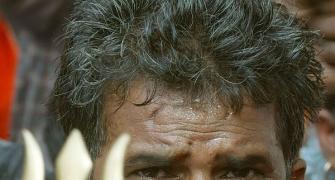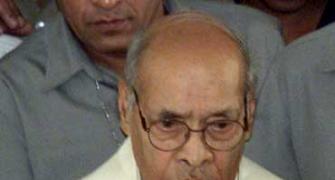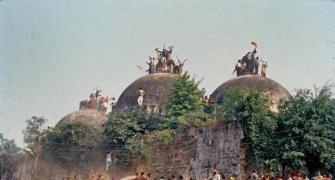
Bharatiya Janata Party veterans L K Advani, Murli Manohar Joshi, Union minister Uma Bharti and nine others will stand trial for criminal conspiracy in the 1992 Babri mosque demolition case, with a special Central Bureau of Investigation court in Lucknow on Tuesday framing charges against them.
The trial under the serious criminal conspiracy charge will commence against them after having been dropped by the trial court in 2001. The verdict was upheld by the Allahabad high court in 2010.
The Supreme Court had ordered restoration of the conspiracy charge against them on April 19. The charges were framed against Advani, 89, Joshi, 83, Bharti, 58, BJP MP Vinay Katiyar, 62, Vishwa Hindu Parishad's Vishnu Hari Dalmiya, 89, and one-time Hindutva firebrand Sadhvi Rithambara, 53 -- all of whom appeared before the court.
All six were granted bail by CBI special judge S K Yadav on a personal bond of Rs 50,000 each after rejecting the CBI's opposition to their bail plea. The court will resume hearing on Wednesday.
The accused, who spent nearly three hours in the court, had sought discharge for the offence of criminal conspiracy, which the judge rejected.
The charge of conspiracy is in addition to the existing charges against them for promoting enmity between different groups on grounds of religion for which they are already facing trial.
The apex court had while restoring the charge of criminal conspiracy, directed clubbing of two cases relating to the demolition. The court had also ordered that the trial be concluded in two years.
Besides the six, conspiracy charges were also framed against Ramvilas Vedanti, Baikunth Lal Sharma, Champat Rai Bansal, Mahant Nritya Gopaldas, Dharam Das and Satish Pradhan -- all of whom were allegedly present when the 16th-century structure in Ayodhya was pulled down on December 6, 1992.
Judge Yadav passed two orders -- one for grant of bail and the other for framing of charges.
The accused are also facing charges of having made assertions 'prejudicial to national integration and injuring or defiling a place of worship'.
The other charges against them include indulging in 'deliberate and malicious' acts intended to outrage religious feelings, uttering statements leading to public mischief, rioting and unlawful assembly.
The maximum punishment upon conviction after restoration of the conspiracy charge could be up to five years in jail or a fine or both, according to a lawyer who attended the proceedings.
The counsel for the accused argued against the framing of charges and pleaded not guilty, saying they had no role in the razing of the mosque.
Advocate Saurav Shamsheri, appearing for Advani and the others, said they would hold consultations with their team of lawyers and decide whether there was a need to challenge the rejection of the discharge applications.
The accused were asked to appear before the court for framing of charges in the light of the Supreme Court order last month.
After Advani, Joshi and Bharti failed to turn up on May 25 and 26, the special court had said no further application for an adjournment or exemption from personal appearance would be entertained. The court had on May 26 fixed the hearing for Tuesday.
Before Advani reached the court, Uttar Pradesh Chief Minister Yogi Adityanath met him at the VVIP guest house in Lucknow.
The Supreme Court had called the destruction of the mosque a 'crime' which shook the 'secular fabric of the Constitution' while allowing the CBI's plea seeking restoration of the criminal conspiracy charge against Advani and others.
However, the top court had said BJP leader and Rajasthan Governor Kalyan Singh, who was the chief minister of Uttar Pradesh when the structure was razed, was entitled to immunity under the Constitution as long as he held the gubernatorial office.
The CBI had charge-sheeted 21 people in the case. Many of them, including Shiv Sena supremo Bal Thackeray and the VHP's Acharya Giriraj Kishore, Ashok Singhal, Paramhans Ram Chandra Das and Mahant Avaidhynath, have since died.
They were all named in an FIR for allegedly instigating a mob which climbed atop the mosque and tore it down, triggering large-scale communal clashes across the country which left hundreds dead and many more wounded.
Bharti, the Union minister of water resources, said before appearing in the court that the mosque was pulled down not as part of a 'criminal conspiracy' but an 'open movement'.
"I was present in Ayodhya on December 6, 1992, which is no secret. Crores of BJP workers, lakhs of officials and thousands of political leaders participated.
"It was an open movement like the movement against the Emergency. I don't see any conspiracy," she said.
BJP MP Katiyar said," There was no conspiracy as the structure was razed openly by a big crowd."
He also targeted Samajwadi Party leader Mulayam Singh Yadav saying that a case should have been lodged against the former chief minister over the firing by police on kar sevaks in Ayodhya in 1990.
"He (Mulayam) himself has admitted that 16 people were killed. He murdered them, he should be booked for it. Babri Masjid was not there, the place belongs to the Ram temple and even the high court has passed the order," Katiyar alleged.
"It is not right and there is no scope for conspiracy charge against us. It was not a conspiracy as whatever had happened had happened openly and lakhs of people were there. There could not be any conspiracy involving such a huge crowd," he said.
The Congress, meanwhile, demanded the resignation of Bharti and asked Prime Minister Narendra Modi to uphold the law and the Constitution.
The party hoped that 25 years after the incident, justice will be done and the guilty punished.
"One of the accused, Uma Bharti is a Union cabinet minister. Having been charge-sheeted, she must resign. The prime minister must come forward and uphold the rule of law and the Constitution," All India Congress Committee in-charge of communications Randeep Surjewala said.
Union minister M Venkaiah Naidu claimed the BJP leaders accused in the case were 'innocent' and will emerge 'unscathed'.
Hindutva leader Vedanti said he was among those who had pulled down the disputed structure in Ayodhya.
"I was one of those who had pulled the dome down," Vedanti told reporters ahead of his appearance in the special court.









